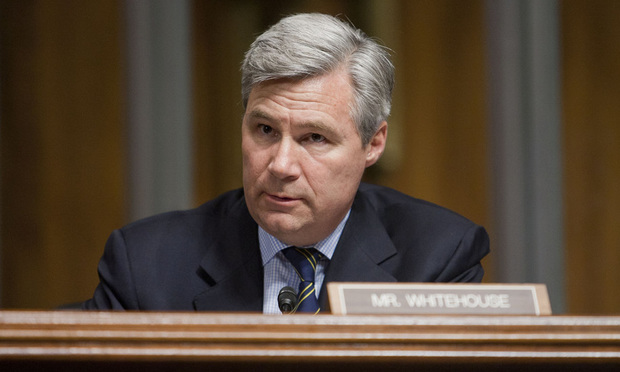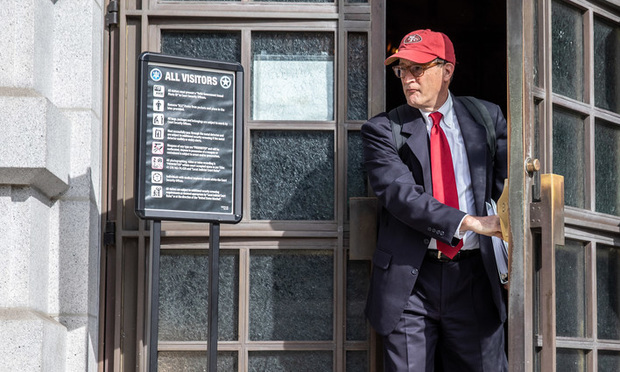Sheldon Whitehouse Slams 'Plainly Inadequate' SCOTUS Amicus Disclosure Rule
The Rhode Island Democrat and two colleagues, Sens. Richard Blumenthal and Mazie Hirono, said the Supreme Court—"on its own behalf and for the sake of other parties and the public"—should "require the disclosure of who is really behind amicus briefs." Whitehouse has made court administration issues a staple in his amicus filings in pending matters.
January 23, 2020 at 01:44 PM
8 minute read
 Senator Sheldon Whitehouse (D-RI). Photo: Diego M. Radzinschi / NLJ
Senator Sheldon Whitehouse (D-RI). Photo: Diego M. Radzinschi / NLJ
The U.S. Supreme Court should take steps forcing broader disclosure of the financial interests backing friend-of-the-court-briefs, U.S. Sen. Sheldon Whitehouse and several Democratic colleagues asserted in a new filing in a closely watched consumer protection case the justices will hear in March.
Whitehouse, joined by U.S. Sen. Richard Blumenthal of Connecticut and Mazie Hirono of Hawaii, made their arguments for greater public disclosure in an amicus brief filed Wednesday backing the lawfulness of the single-director structure of the Consumer Financial Protection Bureau. The case, set for argument in March, has attracted substantial friend-of-the-court briefing from the business community, consumer advocates, legal scholars and others.
The three Senate Democrats, represented by Stephen Susman of Susman Godfrey, questioned the anonymous financial support behind an assortment of briefs in the case Seila Law v. CFPB, a major separation-of-powers dispute that tests the power of the president to fire the heads of independent federal agencies. Business advocates and Republican leaders have long complained the agency director wields too much power and is unaccountable to the president save for removal for misconduct.
"These amicus briefs may appear to be a broad outpouring of support for a legal position, but publicly available information gleaned elsewhere suggests them to be an echo chamber funded by a small and powerful cabal of self-interested entities," Susman told the justices. "We are all thus deprived of knowing how real or artificial this florescence of briefing is."
Whitehouse and his colleagues said the Supreme Court—"on its own behalf and for the sake of other parties and the public"—should "require the disclosure of who is really behind amicus briefs." The Democrats' brief continued: "Regrettably, the court's disclosure rule for amicus briefs, Supreme Court Rule 37.6, is plainly inadequate to provide the court the information it needs to assess potential conflicts. The public knows far too little about the dark-money amici present in this case."
The Supreme Court's Rule 37.6 has come into focus in recent years, as crowd-funded amicus briefs gained popularity and big-ticket cases attracted significant third-party briefing. Whitehouse, formerly a U.S. attorney for Rhode Island, last year sent a letter to Chief Justice John Roberts Jr. decrying "the court's practice of routinely accepting amicus curiae briefs from special interest groups that fail to disclose their donors." Other briefs he's filed at the Supreme Court have questioned the amicus practice there.
In 2018, the high court issued an advisory saying that the rule precluded any amicus brief where contributors are anonymous. The rule requires that amicus brief filers "shall identify every person other than the amicus curiae, its members or its counsel, who made such a monetary contribution."
Whitehouse recently championed the power of prosecutors to fight public corruption in an amicus brief in the Bridgegate case. Whitehouse was represented by Michael Meuti of Benesch on that filing. Whitehouse wrote and filed his own amicus brief in 2018 challenging efforts to expand arbitration.
Senate Republican colleagues publicly lambasted Whitehouse for statements he and fellow Democrats made about the integrity of the court in an amicus brief he filed in a major Second Amendment case last year. Senate Republicans told the justices in a letter that they "must not be cowed by the threats of opportunistic politicians."
In that brief, which argued there was no live controversy for the court to resolve, Whitehouse and other Democrats declared: "The Supreme Court is not well. And the people know it. Perhaps the court can heal itself before the public demands it be 'restructured in order to reduce the influence of politics.' Particularly on the urgent issue of gun control, a nation desperately needs it to heal."
The justices will hear the consumer bureau case March 3. Critics of the agency want the court to grant the president the power to fire the agency director at will.
Kannon Shanmugam of Paul, Weiss, Rifkind, Wharton & Garrison is lead counsel to Seila Law, a California debt collection firm that is fighting a CFPB investigation. Now-Justice Brett Kavanaugh, who participated in an earlier CFPB case as a federal appeals judge, said the "massive, unchecked power" of the CFPB director made it one of the most powerful agencies in Washington. An amicus brief filed by Michael Carvin of Jones Day, on behalf of 27 members of the U.S. House, called the consumer bureau "an unprecedented threat to the separation of powers and to the democratic legitimacy of the federal government."
Here's a roundup of some of the briefs supporting the consumer bureau that arrived at the court this week:
>> Financial regulation scholars (Deepak Gupta of Washington's Gupta Wessler is counsel of record on the brief): "Petitioner seeks to petrify the administrative state by requiring agencies to conform to one of two paradigms: Either the head of the agency must be removable at will by the president or the agency must be structured as a multi-member commission. But there is no basis to believe that commissions foster accountability. This wooden one-or-the-other requirement has no connection to either the constitutional text or the principle of accountability."
 New York Solicitor General Barbara D. Underwood. Photo: David Handschuh/NYLJ
New York Solicitor General Barbara D. Underwood. Photo: David Handschuh/NYLJ>> States of New York, Connecticut, California, Pennsylvania, Delaware, New Jersey and others (Barbara Underwood, solicitor for New York, is counsel of record on the brief): "Depriving the CFPB of all of its powers, as petitioner demands, would harm Amici States by eliminating the CFPB's independent enforcement efforts and the valuable assistance it provides to the States. And invalidating the entirety of Title X would cause even greater injury by stripping from the States the additional substantive powers and protection from federal preemption that Congress sought to confer."
>> Main Street Alliance (Steven Fineman of Lieff Cabraser Heimann & Bernstein is counsel of record on the brief): "Changing the leadership structure of the CFPB would not only contravene well-established precedent, it would fundamentally undermine the agency's work protecting the small business community. Small businesses require fair and equitable access to personal financing, consumer confidence, and transparency to thrive. To date, the CFPB has worked to advance the same interests."
 Douglas Letter, general counsel to the U.S. House of Representatives. Photo: Jason Doiy/ALM
Douglas Letter, general counsel to the U.S. House of Representatives. Photo: Jason Doiy/ALM>> U.S. House of Representatives (Douglas Letter, working with Stanford Law School's Brian Fletcher and Pamela Karlan, is counsel of record on the brief): "For much of the nation's history, Congress has exercised its broad authority to structure the executive branch by creating independent agencies headed by officers removable only for cause. This court has repeatedly approved those removal protections, which provide the covered officers with a measure of independence while preserving the president's authority to remove them if they fail to faithfully execute the laws."
>> Professors Martin Lederman and David Vladeck of Georgetown University Law Center (Lederman is counsel of record on the brief): "There is, moreover, no reason based in text, original understandings, or constitutional history for the Court to reconsider, or to materially narrow, its decisions establishing Congress' power to insulate from presidential control the exercise of most statutory functions Congress assigns to 'independent' agencies and officers."
Read more:
Sen. Whitehouse: There's a 'Crisis of Credibility' at the U.S. Supreme Court
How Paul Clement Is Defending Obama's Consumer Protection Bureau
Sheldon Whitehouse Confronts 'Anonymously Funded' SCOTUS Amicus Briefs
Paul Weiss Pokes Gibson Dunn in New SCOTUS Brief in Consumer Bureau Case
CFPB, Changing Stance, Backs Law Firm Fighting Agency's Independent Design
D.C. Circuit's Brett Kavanaugh Doubles Down on Criticism of CFPB
This content has been archived. It is available through our partners, LexisNexis® and Bloomberg Law.
To view this content, please continue to their sites.
Not a Lexis Subscriber?
Subscribe Now
Not a Bloomberg Law Subscriber?
Subscribe Now
NOT FOR REPRINT
© 2025 ALM Global, LLC, All Rights Reserved. Request academic re-use from www.copyright.com. All other uses, submit a request to [email protected]. For more information visit Asset & Logo Licensing.
You Might Like
View All

Treasury GC Returns to Davis Polk to Co-Chair White-Collar Defense and Investigations Practice
2 minute read
Kirkland & Ellis Taps Former Co-Chair of Greenberg Traurig’s Digital Infrastructure Practice
3 minute read
Government Attorneys Face Reassignment, Rescinded Job Offers in First Days of Trump Administration
4 minute readTrending Stories
- 1When Words Matter: Mastering Interpretation in Complex Disputes
- 2People in the News—Jan. 28, 2025—Buchanan Ingersoll, Kleinbard
- 3Digital Assets and the ‘Physical Loss’ Dilemma: How the Fourth Circuit’s Ruling on Crypto Theft Stands at Odds With Modern Realities
- 4State's Expert Discovery Rules Need Revision
- 5O'Melveny, White & Case, Skadden Beef Up in Texas With Energy, Real Estate Lateral Partner Hires
Who Got The Work
J. Brugh Lower of Gibbons has entered an appearance for industrial equipment supplier Devco Corporation in a pending trademark infringement lawsuit. The suit, accusing the defendant of selling knock-off Graco products, was filed Dec. 18 in New Jersey District Court by Rivkin Radler on behalf of Graco Inc. and Graco Minnesota. The case, assigned to U.S. District Judge Zahid N. Quraishi, is 3:24-cv-11294, Graco Inc. et al v. Devco Corporation.
Who Got The Work
Rebecca Maller-Stein and Kent A. Yalowitz of Arnold & Porter Kaye Scholer have entered their appearances for Hanaco Venture Capital and its executives, Lior Prosor and David Frankel, in a pending securities lawsuit. The action, filed on Dec. 24 in New York Southern District Court by Zell, Aron & Co. on behalf of Goldeneye Advisors, accuses the defendants of negligently and fraudulently managing the plaintiff's $1 million investment. The case, assigned to U.S. District Judge Vernon S. Broderick, is 1:24-cv-09918, Goldeneye Advisors, LLC v. Hanaco Venture Capital, Ltd. et al.
Who Got The Work
Attorneys from A&O Shearman has stepped in as defense counsel for Toronto-Dominion Bank and other defendants in a pending securities class action. The suit, filed Dec. 11 in New York Southern District Court by Bleichmar Fonti & Auld, accuses the defendants of concealing the bank's 'pervasive' deficiencies in regards to its compliance with the Bank Secrecy Act and the quality of its anti-money laundering controls. The case, assigned to U.S. District Judge Arun Subramanian, is 1:24-cv-09445, Gonzalez v. The Toronto-Dominion Bank et al.
Who Got The Work
Crown Castle International, a Pennsylvania company providing shared communications infrastructure, has turned to Luke D. Wolf of Gordon Rees Scully Mansukhani to fend off a pending breach-of-contract lawsuit. The court action, filed Nov. 25 in Michigan Eastern District Court by Hooper Hathaway PC on behalf of The Town Residences LLC, accuses Crown Castle of failing to transfer approximately $30,000 in utility payments from T-Mobile in breach of a roof-top lease and assignment agreement. The case, assigned to U.S. District Judge Susan K. Declercq, is 2:24-cv-13131, The Town Residences LLC v. T-Mobile US, Inc. et al.
Who Got The Work
Wilfred P. Coronato and Daniel M. Schwartz of McCarter & English have stepped in as defense counsel to Electrolux Home Products Inc. in a pending product liability lawsuit. The court action, filed Nov. 26 in New York Eastern District Court by Poulos Lopiccolo PC and Nagel Rice LLP on behalf of David Stern, alleges that the defendant's refrigerators’ drawers and shelving repeatedly break and fall apart within months after purchase. The case, assigned to U.S. District Judge Joan M. Azrack, is 2:24-cv-08204, Stern v. Electrolux Home Products, Inc.
Featured Firms
Law Offices of Gary Martin Hays & Associates, P.C.
(470) 294-1674
Law Offices of Mark E. Salomone
(857) 444-6468
Smith & Hassler
(713) 739-1250








